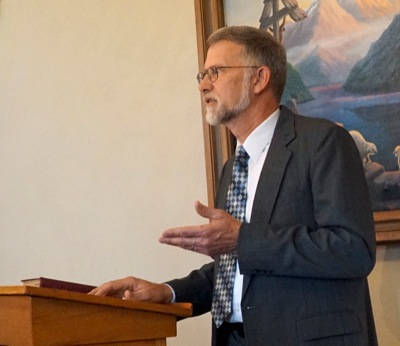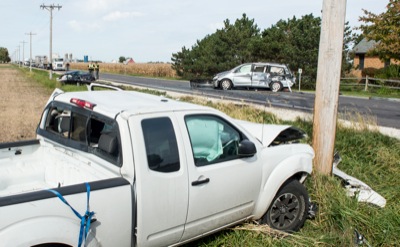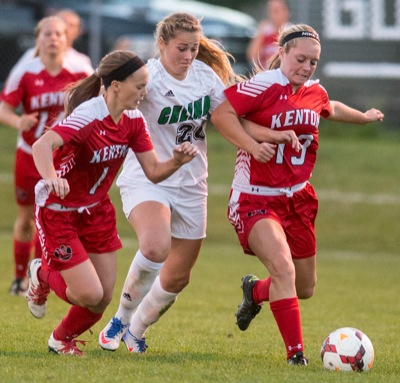Wednesday, October 12th, 2016
Sisters turn over shrine to nonprofit
Move made to ensure future of 170-year-old site
By Ed Gebert

Photo by Ed Gebert/The Daily Standard
Don Rosenbeck, president of the Maria Stein Shrine of the Holy Relics, announces Tuesday the shrine's property and buildings will be handed over to a not-for-profit organization. Members of the Sisters of the Precious Blood have operated the facility for the past 170 years.
MARIA STEIN - After 170 years, Sisters of the Precious Blood officials are turning over the Maria Stein Shrine of the Holy Relics to the laity.
The announcement was made at the shrine Tuesday afternoon by president Don Rosenbeck and board member Sister Joyce Lehman, C.PP.S. The nonprofit organization assuming control is simply named the Maria Stein Shrine of the Holy Relics.
As the number of sisters continued to decrease and those remaining began to age, they knew they would one day need to turn operations over to others.
"The sisters realize that things are changing," Rosenbeck said. "They will help the laity in new ways to ensure the future of the shrine. They are finding themselves at a fork in the road."
Lehman recounted how the facility has changed since the sisters began perpetual adoration at Maria Stein in 1846. Last month, the shrine celebrated Heritage Days, marking the occasion.
"At one point, we had almost 60 sisters living in this building or in the buildings that were with it," she said. "It was in the mid-1800s to the early 1900s that this was not only a home to the sisters, but also a working farm."
Nuns who were teachers worked in area Catholic schools for many years.
"But the most important work of the sisters here was the adoration of the Blessed Sacrament in the daily chapel," Lehman added. "They held that adoration day and night."
In 1923, the nuns' motherhouse was moved to Dayton, and the number of sisters living locally dwindled and aged.
"It became impossible for the sisters to be able to farm their own land and care for the animals that provided the milk and the meat and the wool," Lehman said. "So the land was rented to local farmers. The outbuildings and the parts of the house that were not used were eventually torn down."
Over the shrine's 170 years, the sisters also have served as guardians over what is now the second-largest relic collection in the U.S., Rosenbeck said.
"That collection includes relics of all the apostles except Judas and includes all the authors of the Gospels," he said.
The nuns also always remained devoted to prayer, Rosenbeck added.
With the transfer of the 24 acres and the buildings to a nonprofit organization, a fund was established to provide income for the shrine's operation and maintenance. The Legacy Fund of Maria Stein was created to raise the $6 million needed to generate adequate income and ensure the shrine's survival. The first $2 million was donated by the Sisters of the Precious Blood.
"I have to give the sisters a lot of credit because they started looking ahead a number of years ago preparing for this time," Rosenbeck noted.
After the first $2 million, an anonymous donor came forward to match dollar-for-dollar cash donations and pledges through the end of 2022.
"To date, we have raised about $950,000 in gifts and pledges, meaning we have about $1.1 million left to raise. We are well under way to securing the future of the shrine," Rosenbeck said. "We expect this holy site will be here for our children and grandchildren for generations to come."
The not-for-profit entity was formed in 2010 with a board of directors consisting of six sisters and three laypeople. Since that time, the board as been expanded to 12 members: four sisters and eight laypeople.
"The plan all along was as time went by that would shift, and as the terms of the directors expired, we would add more lay people to the board," Rosenbeck said. "So the majority of the board is now laypeople from the area."
"The German Catholic community, whose ancestors learned much of their spirituality from the Sisters of the Precious Blood, has demonstrated a real commitment to the shrine," Rosenbeck continued. "Just as local parishes are involving the laity more and more, so too will the shrine."
Lehman said the nuns realized it was time to deed the shrine over to the nonprofit organization.
"I think this is our way of saying, 'we believe that the laity are more than capable of doing and holding sacred what we have held sacred all these years,' " she said. "Although we are comfortable knowing that, it is still a difficult decision. And it's a sad decision for us to make because we've spent 170 years really, in a sense, being guardians of this land and of the rich treasure of both faith and the relics we have here. We do trust, however, that it is going to be in good hands and the ministry will continue for the greater honor and glory of God."



